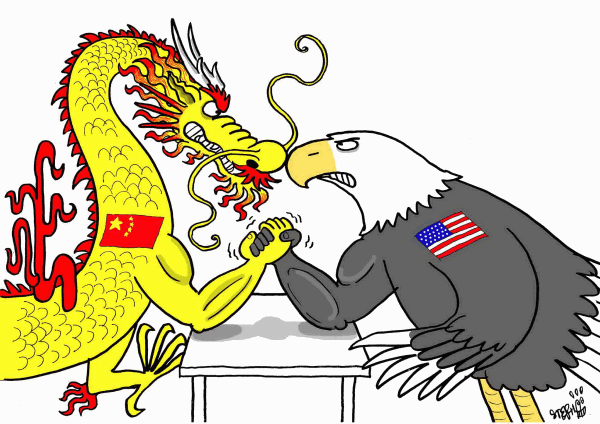
China's Treatment of the US Cannot Be Limited to 'Scolding'
China has long been critical of the U.S. regarding the contested region. Beginning in 1995 with the Meiji Reef incident and continuing to Hillary Clinton's 2009 speech in Hanoi, the U.S. has completed a full about-face from its former stance of not holding any position on issues of sovereignty and is now openly stepping into the South China Sea dispute. With a series of strategic moves including the "return to" and "rebalance of" Asia, the U.S. has been widely seen as reenacting a "siege" of China.
And as far as China is concerned, if the Philippines and other nations involved in disputes do not constitute a true threat due to a lack of sufficient combined might, and as such become no more than nuisances, then it is fair to say that the U.S., as the strongest nation in the world today, is hiding deeper problems.
The opprobrium surrounding U.S. involvement in the South China Sea dispute is primarily manifested within three distinct facets of the issue. First is the overt and traditional battle for security. Obama stayed only two days in the Philippines but brought what will be a decade-long Enhanced Defense Cooperation Agreement with him. The action is very likely to set off a new round in the arms race in the South China Sea, with the implied targeting of China going unspoken, yet being abundantly clear. Second is the under-the-table, nontraditional battle for security. U.S. support and encouragement from behind the scenes cannot be overlooked as a factor prompting the Philippines to unilaterally submit its case for arbitration. Third is the more nebulous battle for leadership. From the formulation of codes of conduct to the Trans-Pacific Partnership talks, the U.S. is vying against China for the authority to lead in the political and economic arenas.
Indeed, there are many distasteful features of the U.S., but the censure of it is easily overstated at times, even to the point of exaggeration, leading many people to only focus on the negative aspects of the U.S. and ignore its potential for good. In fact, the U.S. can play a positive role in the South China Sea affair. First, the U.S. can act as a "guardian" of sorts. Whether it is the Philippines to the south or Japan to the east, they are both the "wards" of the U.S. to some extent. And as the prospective paterfamilias, the U.S. has the authority to "instruct" their behavior.
Next, the U.S. can play the part of peacemaker. As the sole remaining superpower and with the appellation of "world police," as long as it can maintain an objective and just stance, there is none better suited to the position. Finally, the U.S. can still serve as a proverbial punching bag when needed. China can chastise the U.S. for its favoritism while the Philippines and Japan, in a similar vein, can reproach the U.S. as a disappointment. Let the U.S. wallow a bit longer in these muddy waters until it is rendered completely ineffectual on all fronts, becoming a ripe target for everyone's frustrations — is this not ideal?
Perhaps today the U.S. and China still cannot be counted as true friends. However, an inability to become friends does not necessitate becoming enemies. In the ratings scale that China uses to evaluate the U.S., there exist more than the two options of "full marks" and "not making the cut." The daily barrage of criticism and mudslinging toward the U.S. is no help to the establishment of a new type of great power relations but will rather likely stir up nationalist sentiment within China.
Chinese President Xi Jinping has previously stated that the Pacific is vast enough to accommodate both U.S. and Chinese development. The two powers both living under the same Pacific roof, so to speak, is in itself a sort of shared destiny. Perhaps the U.S. and China both need to change their thoughts and views on the other and calmly sit down for an old-fashioned heart-to-heart.
The author works for the National Institute for South China Sea Studies.
